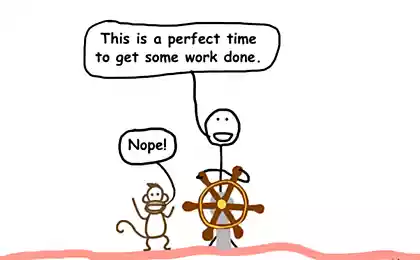118
8 Signs That You Should Give Up on Your Goals

We live in an age of the cult of achievement, where giving up a goal is perceived as a defeat. But what if the ability to retreat in time is not a weakness, but the highest form of wisdom? Psychological research shows that the ability to rethink one’s priorities is directly related to one’s level of life satisfaction and mental health.
Why it is so important to be able to give up goals
Modern psychology of goal-setting highlights the phenomenon rigidity A condition in which a person continues to pursue a goal even when it is no longer relevant or attainable. Research by Carol Dweck of Stanford University shows that people with fixed thinking are more likely to suffer from this problem than those who develop flexible thinking.
True strength lies not in achieving your goals at any cost, but in honestly assessing their value to your life and changing course if necessary.
Eight Critical Signals to Review Goals
1 Conflict with fundamental values
Alert: Achieving a goal requires violating your basic principles.
When the path to a goal is through compromise with conscience, it is the first and most important sign of the need to stop. Personal integrity is the foundation of psychological well-being. Neuropsychological studies show that violating one’s own values activates the same areas of the brain as physical pain.
Imagine a manager who dreams of getting a promotion, but realizes that he will have to deceive his customers. Even if they get the job they want, they will experience permanent internal dissonance that can lead to depression and loss of self-esteem over time.

2 Lack of internal motivation
Extreme motivation – movement towards the goal under the influence of external factors – is one of the main predictors of dissatisfaction with the result. Desi and Ryan’s theory of self-determination proves that goals imposed by society, family, or stereotypes rarely bring true happiness.
Practical test: Ask yourself, “If no one knew about my goal, would I pursue it?” An honest answer will clarify a lot.
3Chronic exhaustion without joy
Healthy goal-setting should include elements eudemonia Deep satisfaction with the process. If every step towards a goal turns into anguish, and small victories do not bring joy, it is a signal of the wrong direction.
Remember: the goal should energize, not exhaust. If you feel like a lemon after every day of working on your dreams, maybe you should re-prioritize.
4 Ignoring intuitive signals
Intuition is not mysticism, but the result of subconscious processing of information. Neuroscientist Antonio Damasio in his research proved that emotional signals of the brain often outpace rational analysis and can warn of potential problems.
Constant discomfort with the thought of a goal, anxiety and inner resistance are not obstacles that need to be overcome by willpower. This is valuable information from your subconscious about the inconsistency of the goal with your true needs.
5 Series of adverse circumstances
The concept of serendipity in the psychology of success states that when we move in the right direction, circumstances often turn in our favor. If you are constantly faced with obstacles, it is worth analyzing: perhaps the universe is trying to tell you something.

6 Dependence on the sole source of happiness
Psychologists call it. emotional monogamy. When all your well-being depends on achieving one goal, you become psychologically vulnerable. Studies show that people with diversified sources of satisfaction are more resilient to stress and depression.
Dangerous thought: “If I don’t do that, my life will be incomplete.” Such attitudes are a direct path to emotional burnout.
7 Fear-based motivation
Fear is a powerful but destructive motivator. Goals born of fear of failure, judgment, or loneliness rarely lead to true satisfaction. They create a vicious circle: even when you achieve what you want, you don’t feel relief because fear doesn’t go away.
Rewording: “I have to lose weight or no one will love me.” I want to be healthy to feel energetic and joyful.
8 Critical excess of available resources
Stephen Hobfall’s Theory of Resource Saving explains that people tend to conserve and accumulate resources (time, energy, money, social support). When the goal requires their critical exhaustion, it threatens the overall balance of life.
Wisdom is not about being able to do everything, it is about knowing exactly where to spend your limited resources.
How to abandon the goal: a step-by-step algorithm
The algorithm of conscious refusal:
- Pause analysis: Stop for a week, do not take active actions to achieve the goal.
- Value audit: Check your goals against your core values
- Resource calculation: Honestly assess the real costs and available resources
- Alternative search: Find three other ways to satisfy the need behind the goal.
- Environmental consultation: Discuss your doubts with trusted people
- Decision: Make a final decision based on all the information collected
The Art of Revising Priorities
Abandoning a goal is not a defeat, but an evolution of consciousness. This is a sign of maturity of a person who is able to adapt to changing circumstances and new information about himself. Psychological flexibility is a key factor in resilience and long-term well-being.
Remember: your life is not a race to a predetermined finish, but a creative process of constant self-discovery and growth. The ability to say “stop” to an inappropriate goal frees up energy for truly important accomplishments. Listen to yourself, trust your intuition, and don’t be afraid to change course when your inner compass points in a new direction.
Glossary of terms
Target rigidity A psychological condition in which a person is unable to revise or change his or her goals even when circumstances change.
Extreme motivation motivation based on external factors: approval of others, material rewards, avoidance of punishment
eudaemonia Deep satisfaction and meaning derived from activities consistent with personal values and potential
Serendipity The ability to make important discoveries by accident or to find something valuable without specifically seeking it
Emotional monogamy for the purpose of Psychological state in which all emotional well-being depends on the achievement of one specific goal
Psychological flexibility Ability to adapt behavior and goals to changing circumstances and personal values
Personal integrity a state of harmony between values, beliefs and actions of a person
5 things that reduce your value in the eyes of others
15 Ways to Stop Saying Too Personal Things at Work























